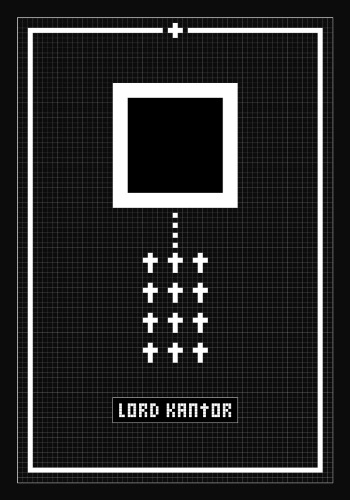Outer space radio play LORD KANTOR by Radio Kraków
The radio play LORD KANTOR is a part of the official ceremonies for the opening of the new seat of Cricoteka, Centre for Documentation of the Art of Tadeusz Kantor, and will premiere on Radio Kraków on the 12th of September at 21:15.

LORD KANTOR, radio play:
Playwright, director: Mateusz Pakuła
Music: Antonis Skolias, featuring: Jorgos Skolias
Graphic design: Jakub Woynarowski
Radio production: Wojciech Gruszka
Starring:
Wiktor Loga-Skarczewski as JOHN 102 and LORD KANTOR
Jan Peszek as MISZEL KOMODORE
Zuzanna Skolias as COSMIC DWARF
Lord Kantor, Mateusz Pakuła’s original radio play produced by Radio Kraków as part of the Cricoteka opening ceremonies will premiere on the 12th September 2014 at 12:00.
A spacecraft pilot, John 102 (Wiktor Loga-Skarczewski), his faithful on-board computer, Miszel Komodore (Jan Peszek), John 102’s space-drifting defender, Cosmic Dwarf (Zuzanna Skolias) and Lord Kantor, a cosmic villain, are the characters in Mateusz Pakuła’s original radio play, a tragicomic sound cartoon and an adventure into vintage music from the early computer games.
LORD KANTOR – Mateusz Pakuła’s radio play is full of references to pop-cultural icons from the 1980s and 90s: early computer games like the legendary Space Invaders and sci-fi films e.g. 2001: A Space Odyssey. The author claims, nonetheless, that Tadeusz Kantor and science fiction or space travel only apparently are disparate worlds:
I believe that sci-fi is really just a shell or a convention we employ in this radio play. But the play itself and the performance are in a rather deep conversation with Kantor’s thought and his ideas, primarily the ones conveyed by his writings, but also by the performances and his entire work.
Jan Peszek, even as he admits to have never taken science fiction seriously, considers connecting the two worlds a great idea:
Tadeusz Kantor was for his contemporaries a man from another planet. He was an artist of powerful and unique personality, one which might be called absolutely other-worldly. Thus, placing him in a science fiction context seems to me fully fitting.
Mateusz Pakuła’s Lord Kantor takes place on-board spacecraft taken from old-school (1980s) films, TV-series and computer games. The personal on-board computer, Miszel Komodore, running the spacecraft like HAL 9000 of Kubrick’s Space Odyssey is just as old-school (Commodore was one of the first personal computers used also for games). The spacecraft crew is ‘pilot inter-m-planet captain John 102’. In the morning, Miszel Komodore performs a weekly memories session on John 102. It will soon turn out that John 102 is a clone, whose consciousness (or memory) consists of the memories of all his (probably 101) predecessors. “I am each of my subsequent versions. This is how the real eternal life comes into being”, says John 102.
Memories loaded into John 102’s brain by Miszel Komodore, are snapshots of films, from Barnaby the bear to Grażyna Bąkiewicz’s Space Voyagers, childplay and toys, but also snippets of family histories, wishes and dreams. As he closes the session, Miszel Komodore announces to John 102 that his target, General Zerg, assumed a new name: Lord Kantor. ‘Lord’ is no surprise to John 102 (the outer space comprises also Lord Vader), but he associates ‘Kantor’ only with an exchange office which in Polish is called ‘kantor (wymiany walut)’.
So far Lord Kantor is nowhere to be found, but there is a ‘living organism of earthly origin’ drifting in space. Sucked in by an on-board hoover, he turns out to be the Cosmic Dwarf. The Cosmic Dwarf is from Kraków (just as, according to him, all the other famous dwarves, including Bilbo and Frodo). He talks about the Earth which has turned into a battlefield, and these are not even people battling, but some grotesque forces (“radioactive Turkish cacti have invaded China”). Poland, too, is in trouble: the dwarves of Krakow are fighting the Godzillas, while in Warsaw “the only remaining living creatures are humans in suits”.
The spacecraft is approaching the planet Melancholia to land in the Nostalgia station “to gather an express report concerning General Zerg”. A report of the present events. General Zerg, however, maintains firmly that his name is Lord Kantor. Lord Kantor (who is “an ugly fella thirsty for spectators of his fucking ego”) gives a speech: the force of memory finally struck him as “the creative and destructive element. Living on a par with actual events of everyday life”. Lord Kantor wishes to gulp all the memories of every human – the ones applied in small doses to John’s subsequent clones – which would make him feel God-like, while the humans, freed of their memories, would be able to start again. “Knock, knock. It’s me, your God! The room of my childhood is a black, crowded hole, where I shall never return. Ahahaha – whoah! To remember and forget everything! Total power over reality! No-one will ever return to their hole. You, idiots, are saved, you don’t need to thank me”.
John 102 would not relinquish his (and others’) memories, so with the help of the plasma-spitting Cosmic Dwarf annihilates Lord Kantor. But Lord’s underlings keep shooting and hit the spacecraft – the core is broken and all the crowded memories of all the clones spill out in the final desperate monologue, as well as the very own memories of the artificial brain.
Joanna Targoń
The text is based on Radio Kraków press release.

